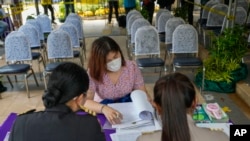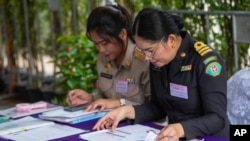Thailand on Monday officially began the selection of new senators, a process that has become part of an ongoing war between progressive forces hoping for democratic political reforms and conservatives seeking to keep the status quo.
Hopeful candidates headed to district offices across the country on the first day of registration to compete for one of the 200 seats in Parliament’s upper house.
The power of the Senate — although limited compared to the House of Representatives, which is tasked with law-making responsibilities — was demonstrated dramatically when it blocked the progressive party that won the most seats in last year's election from forming a new government.
The senators were able to do so because of the 2017 Constitution, passed under a military government, which requires the prime minister to be approved by a joint vote of the elected House and the Senate, which was appointed by the military regime.
The Move Forward Party was opposed by senators who disapproved of its vow to seek reforms of Thailand’s monarchy.
The process of selecting the new senators will include three rounds of voting: district, provincial and national.
Unlike the elected lower house legislators, the senators will be chosen by their fellow applicants, competing in 20 categories such as occupation or social position, including women, the elderly and the disabled.
The final results are expected to be announced in July.
The selection process in the Constitution is so complicated and unclear that critics say it was deliberately designed to discourage public participation. Critics say the Constitution also allows the state bureaucracy to hold more power than directly elected political officeholders.
The new senators will no longer be able to take part in selecting a prime minister but will retain the power to approve legislation passed by the House.
They also have the power to select members of nominally independent regulatory bodies such as the Election Commission and the Constitutional Court, whose work has been widely seen as impeding efforts at political reform and crippling proponents with legal penalties, including prison.
The Senate’s votes are also required to amend the Constitution. The governing Pheu Thai party is pushing for a new charter to replace the 2017 one to facilitate certain reform efforts promised during the campaign.
Civil society groups have campaigned to raise public awareness and encourage those favoring democratic reforms to enter the Senate selection process.
Law reform advocate Yingcheep Atchanont of the group iLaw has been organizing public discussions on the importance of the Senate and workshops to help would-be applicants understand how the selection process works.
“We are telling people what to do if they want change. There have been calls in recent years to reduce the power of the Senate, to get rid of the Senate," he said. "All of this can only happen if we can amend the Constitution, and we need enough votes from the senators for that.”
Candidates must be more than 40 years old and have more than 10 years of experience in their chosen occupational group, the latter provision not applying for those competing in one of the social identity groups. They also cannot campaign or do anything that can be interpreted as campaigning.
Even the Election Commission has acknowledged how complicated the process is but says it will be able to carry it out smoothly and transparently.
Purawich Watanasukh, a political science lecturer at Bangkok's Thammasat University, said he thinks the complicated rules were intentionally designed to reduce public participation.
“This is the contest of the people to debug not just the Senate itself, but the Constitution, which would lead to a new political landscape in Thailand,” he said, ““It will be the next battleground between the progressive movement and the establishment.”












